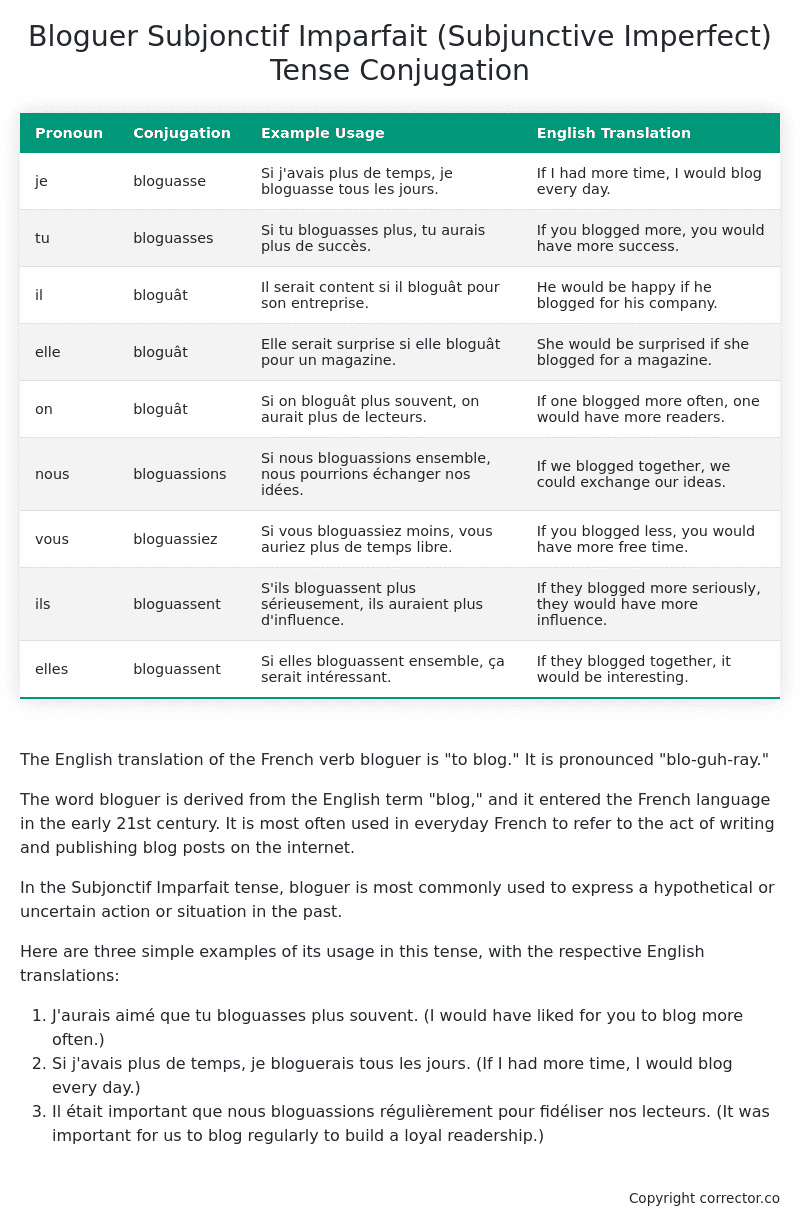Subjonctif Imparfait (Subjunctive Imperfect) Tense Conjugation of the French Verb bloguer
Introduction to the verb bloguer
The English translation of the French verb bloguer is “to blog.” It is pronounced “blo-guh-ray.”
The word bloguer is derived from the English term “blog,” and it entered the French language in the early 21st century. It is most often used in everyday French to refer to the act of writing and publishing blog posts on the internet.
In the Subjonctif Imparfait tense, bloguer is most commonly used to express a hypothetical or uncertain action or situation in the past.
Here are three simple examples of its usage in this tense, with the respective English translations:
- J’aurais aimé que tu bloguasses plus souvent. (I would have liked for you to blog more often.)
- Si j’avais plus de temps, je bloguerais tous les jours. (If I had more time, I would blog every day.)
- Il était important que nous bloguassions régulièrement pour fidéliser nos lecteurs. (It was important for us to blog regularly to build a loyal readership.)
Table of the Subjonctif Imparfait (Subjunctive Imperfect) Tense Conjugation of bloguer
| Pronoun | Conjugation | Example Usage | English Translation |
|---|---|---|---|
| je | bloguasse | Si j’avais plus de temps, je bloguasse tous les jours. | If I had more time, I would blog every day. |
| tu | bloguasses | Si tu bloguasses plus, tu aurais plus de succès. | If you blogged more, you would have more success. |
| il | bloguât | Il serait content si il bloguât pour son entreprise. | He would be happy if he blogged for his company. |
| elle | bloguât | Elle serait surprise si elle bloguât pour un magazine. | She would be surprised if she blogged for a magazine. |
| on | bloguât | Si on bloguât plus souvent, on aurait plus de lecteurs. | If one blogged more often, one would have more readers. |
| nous | bloguassions | Si nous bloguassions ensemble, nous pourrions échanger nos idées. | If we blogged together, we could exchange our ideas. |
| vous | bloguassiez | Si vous bloguassiez moins, vous auriez plus de temps libre. | If you blogged less, you would have more free time. |
| ils | bloguassent | S’ils bloguassent plus sérieusement, ils auraient plus d’influence. | If they blogged more seriously, they would have more influence. |
| elles | bloguassent | Si elles bloguassent ensemble, ça serait intéressant. | If they blogged together, it would be interesting. |
Other Conjugations for Bloguer.
Le Present (Present Tense) Conjugation of the French Verb bloguer
Imparfait (Imperfect) Tense Conjugation of the French Verb bloguer
Passé Simple (Simple Past) Tense Conjugation of the French Verb bloguer
Passé Composé (Present Perfect) Tense Conjugation of the French Verb bloguer
Futur Simple (Simple Future) Tense Conjugation of the French Verb bloguer
Futur Proche (Near Future) Tense Conjugation of the French Verb bloguer
Plus-que-parfait (Pluperfect) Tense Conjugation of the French Verb bloguer
Passé Antérieur (Past Anterior) Tense Conjugation of the French Verb bloguer
Futur Antérieur (Future Anterior) Tense Conjugation of the French Verb bloguer
Subjonctif Présent (Subjunctive Present) Tense Conjugation of the French Verb bloguer
Subjonctif Passé (Subjunctive Past) Tense Conjugation of the French Verb bloguer
Subjonctif Imparfait (Subjunctive Imperfect) Tense Conjugation of the French Verb bloguer (this article)
Subjonctif Plus-que-parfait (Subjunctive Pluperfect) Tense Conjugation of the French Verb bloguer
Conditionnel Présent (Conditional Present) Tense Conjugation of the French Verb bloguer
Conditionnel Passé (Conditional Past) Tense Conjugation of the French Verb bloguer
L’impératif Présent (Imperative Present) Tense Conjugation of the French Verb bloguer
L’infinitif Présent (Infinitive Present) Tense Conjugation of the French Verb bloguer
Struggling with French verbs or the language in general? Why not use our free French Grammar Checker – no registration required!
Get a FREE Download Study Sheet of this Conjugation 🔥
Simply right click the image below, click “save image” and get your free reference for the bloguer Subjonctif Imparfait tense conjugation!

Bloguer – About the French Subjonctif Imparfait (Subjunctive Imperfect) Tense
Formation
Common Everyday Usage Patterns
Interactions with Other Tenses
Subjonctif Présent
Indicatif Passé Composé
Conditional
Conditional Perfect
Summary
I hope you enjoyed this article on the verb bloguer. Still in a learning mood? Check out another TOTALLY random French verb conjugation!


